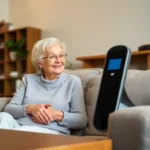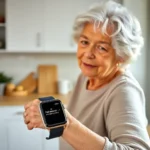What AI Tools Help Older People
What AI tools help older people in their daily lives. There are several AI tools are proving to be invaluable in enhancing the quality of life for older people. They are promoting independence, and ensuring safety.
ElliQ. An AI companion specifically designed for older adults, providing engaging conversations, entertainment, and health reminders. It encourages social interaction, suggests activities, and assists with medication schedules.
Smart Home Systems. AI-powered devices enhance safety with fall detection and emergency monitoring. These systems can alert caregivers and emergency services when unusual activity is detected.
Health Monitoring Devices. AI-based trackers monitor vital signs such as blood pressure, heart rate, and oxygen levels, allowing older people to manage their health proactively and share data with doctors.
Voice-Activated Assistants. Amazon Alexa, Google Assistant, and Siri offer hands-free support for setting reminders, playing music, making calls, and controlling smart home devices, making daily tasks easier for older people.
Cognitive Games and Memory Support Apps. AI-driven applications provide personalized mental exercises to help improve memory and cognitive skills, adapting to individual progress levels.
Fujitsu's Gerontechnology Platform. A comprehensive solution integrating AI, 5G, and IoT to facilitate healthcare monitoring and remote consultations for older adults.
CarePredict. An AI-powered platform that helps caregivers and families make informed decisions about the care of older people. This offers personalized assistance based on behavioral patterns.
Amazon Alexa Care Hub. A practical tool for caregivers to stay connected with older people, allowing them to age in place safely and comfortably.
These AI tools are designed to be user-friendly. They address essential aspects of the care of older people such as health management, safety, and social engagement. By integrating AI into their daily lives, older adults can enjoy greater independence and an improved overall well-being.
ElliQ Stands Out From Other AI Companions For Older People in Several Key Ways
Proactive engagement. Unlike virtual assistants like Siri or Alexa, ElliQ can initiate conversations and activities, making it more engaging for older adults.
Specialized design. ElliQ was specifically created for adults 65 and older, focusing on their unique needs and preferences.
Comprehensive functionality. It offers a wide range of features including health monitoring, entertainment, social connection, and cognitive stimulation.

Physical presence. ElliQ has a small physical counterpart that can move and light up. This provides a more tangible presence compared to purely voice-based assistants.
Conversational depth. The AI can engage in more complex discussions on topics like religion and the meaning of life, offering deeper interaction.
Personalization. ElliQ adapts to individual users, learning their preferences and routines over time.
Health focus. It includes features specifically designed to support older peoples well-being, such as medication reminders and daily health check-ins.
While ElliQ shows promise in reducing loneliness and improving well-being for some older people, it's important to note that reactions can vary. Some users find it helpful and engaging, while others may perceive it as intrusive or unnecessary. Additionally, concerns about data privacy and over-reliance on AI companions have been raised.
Compared to other companion robots, ElliQ's focus on proactive engagement and specialized design for older adults sets it apart in the current market of AI companions for older people.
MindMate offers several key benefits for cognitive enhancement
Comprehensive cognitive stimulation. The app provides a suite of brain games designed to challenge core cognitive abilities. This includes problem-solving, speed, memory, and attention.

Personalized daily activities. MindMate offers a tailored daily plan to keep both mind and body fit, incorporating workouts, healthy recipes, and brain games.
Holistic approach. Beyond cognitive exercises, the app includes features for physical exercise, nutrition advice, and social engagement. This aligns with the multi-part lifestyle intervention shown effective in the FINGER study.
Potential cognitive benefits. While not specific to MindMate, cognitive stimulation interventions have shown moderate-quality evidence for small improvements in cognition, equivalent to about a 1.99 point increase on the MMSE scale.
Quality of life improvements. Users report increased happiness, improved quality of daily life, and better overall health.
Alzheimer's and dementia support. The app is designed to benefit those with memory problems like Alzheimer's or dementia. Also to those at risk of cognitive decline.
User engagement. MindMate includes features like a jukebox and television section to keep users engaged. This is particularly beneficial for those with dementia.
Health tracking. The app can connect to Apple's HealthKit to store and record activities such as daily steps. This helps users monitor their physical activity.
Can AI Tools Like Sensi Help Older People Live Independently?
Yes, AI tools like Sensi.AI can significantly support older people in maintaining their independence for longer periods. Sensi.AI is an innovative audio-based AI solution designed to assist older people aging in place. It is provides caregivers and families with valuable insights.
Key benefits of Sensi.AI for independent living for older people.
24/7 Monitoring. The system employs discreet audio pods to continuously assess older persons' well-being. It detects subtle changes in behavior and health patterns.
Real-Time Alerts. Caregivers receive immediate notifications about potential issues such as falls, requests for help, or early signs of cognitive decline.
Personalized Care. Sensi.AI establishes a unique baseline for each individual, allowing for precise anomaly detection and tailored care plans.

Enhanced Safety. By identifying issues early, the technology helps reduce hospitalizations. In one case study, a older person with severe dementia experienced a significant reduction in falls and hospital visits after using Sensi.AI.
Proactive Care. The system provides actionable insights, enabling caregivers to make informed decisions and adjust care plans proactively.
Privacy-Focused. Unlike video-based systems, Sensi.AI prioritizes older people's privacy by relying solely on audio analysis.
Family Peace of Mind. Families can feel reassured knowing there is an additional layer of safety and support in place for their loved ones.
While Sensi.AI offers promising benefits for the independent living of older people, its effectiveness may vary depending on individual needs. Proper setup and caregiver training are essential to ensure optimal use of the technology.
How do AI-powered health trackers benefit older persons daily lives?
AI-powered health trackers provide numerous advantages to older people, enhancing their well-being and promoting independent living. These intelligent devices monitor various health metrics, enabling proactive care and timely interventions.
The Key Benefits of AI-Powered Health Trackers For Older People
Continuous Health Monitoring. These devices track vital signs such as heart rate, blood pressure, and oxygen levels, providing real-time health data.

Early Detection of Health Issues. AI algorithms analyze collected data to identify potential health problems before they become serious, allowing for timely medical intervention.
Fall Detection and Prevention. Many wearable trackers can detect falls and automatically alert emergency services, improving safety for older people living independently.
Medication Management. AI-powered apps send medication reminders, helping older people adhere to their treatment schedules and reducing the risk of missed doses.
Sleep Tracking. These devices monitor sleep patterns, offering insights to improve sleep quality and overall well-being.
Activity Monitoring. AI health trackers encourage older people to maintain an active lifestyle by tracking physical activity levels and providing motivation.
Remote Monitoring for Caregivers. Family members and healthcare providers can access health data remotely, enabling better-informed care decisions and providing peace of mind.
Personalized Health Recommendations. Based on collected data, AI provides tailored suggestions for nutrition, exercise, and lifestyle adjustments.
Enhanced Independence. By offering comprehensive health monitoring, these devices empower older people to live independently while receiving necessary support.
Improved Communication with Healthcare Providers. The data collected by these devices can be shared with doctors, facilitating more effective virtual check-ups and consultations.
AI-powered health tracking solutions not only improve older people's physical health but also contribute to their overall well-being by fostering independence, reducing anxiety, and encouraging a proactive approach to health management.
Are There Any AI Tools Specifically For Dementia Sufferers
You bet there are some AI tools out there specifically designed to help older people with dementia. Here’s a quick rundown of some cool options:
ElliQ. Think of it as an AI companion that keeps older adults, especially those with mild cognitive impairment (MCI), engaged, helps with health monitoring, and even gives their brain a bit of a workout.
RAZ Memory Cell Phone. This one's a simplified smartphone packed with Amicus Brain’s Dementia Care AI Advisor. It’s perfect for people with dementia and gives caregivers some solid advice when they need it.

LifeGuide. A daily living assistant powered by AI, this one’s all about offering tailored support for older people with MCI, helping them hold on to their independence and improving their day-to-day lives.
Dementia VoiceBot. Still in development, but this AI-powered tool is designed to combat loneliness by chatting with dementia patients in a way that suits their communication style.
Digital Companion. Being tested in Australia, this one’s an AI video personality that’s ready for a chat, offering dementia patients daily conversations to keep them engaged.
MemPal. A wearable AI assistant that helps people with memory issues by offering things like memory support, object retrieval, and safety reminders. It even recognizes things around you with computer vision.
Simon. In beta testing right now, Simon uses geo-tracking and machine learning to help people with dementia by giving them reminders, like what their PIN is when they’re at the bank.
Liv. A photorealistic 3D avatar that’s always on call. It uses AI based on real-life experiences of dementia patients, offering advice that's spot-on, private, and compassionate.
These AI tools are designed to tackle everything from loneliness and memory issues to managing everyday tasks, helping older people stay independent, and making life a little easier for both patients and caregivers.
Conclusion on What AI tools help older people
AI is no longer just a futuristic concept—it’s actively transforming the lives of older adults today. From smart companions like ElliQ that reduce loneliness to AI-powered health trackers that provide real-time monitoring, these tools are empowering older people to live more independently, safely, and confidently. Whether it’s managing daily routines, staying socially engaged, or ensuring timely health interventions, AI is bridging the gap between aging and autonomy.
As technology continues to evolve, the key is to embrace these innovations in a way that complements—not replaces—human care. With the right AI tools, older people can enjoy a better quality of life while caregivers gain peace of mind, knowing their loved ones have intelligent support when they need it most.
What do you think? Have you or a loved one used AI tools for the care of older people? Share your thoughts in the comments!